News Details
SP2 expands practical experience for MSW students through simulation curriculum
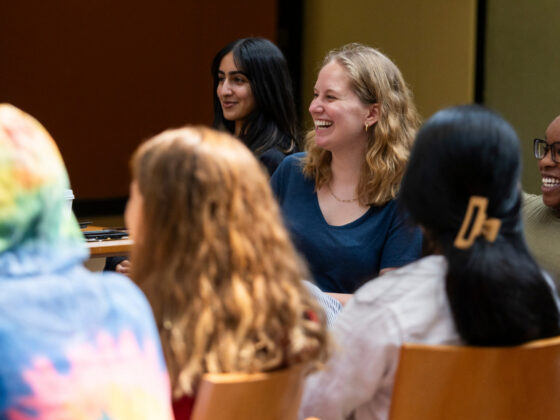
Authored by: Juliana Rosati
Photography by: Krista Patton
Student Life
11/29/23
“Do you have a bed for me tonight?” The question was asked insistently by a sixty-year-old man with a history of housing insecurity and substance use disorder, who had come to a supportive housing agency seeking help. The man was not a real client, but a fictional character in a script portrayed by a social work professional as part of a simulation in the Master of Social Work (MSW) Program at Penn’s School of Social Policy & Practice (SP2).
Student Winnie Chang, playing the role of a social worker, found herself flustered as she attempted to respond. So she “tapped out” of the scenario, held live over Zoom, and consulted her instructors and classmates.
Then in her first year of the program, Chang already had on-the-ground social work experience through her field placement in a Philadelphia public school, where she helped children with emotional and social skills. But the simulation — an enhanced component of the MSW curriculum at SP2 — pushed her to imagine the demands of a different population and situation.
“Prior to the simulation, I made pages and pages of notes to prepare,” says Chang. “But it was so realistic that I started getting nervous. The character is really reluctant to engage. He previously had a stable job, but he lost it due to problems related to alcohol use. He’s been in and out of housing for decades, and so he doesn’t trust the system.”
With input from her classmates and instructor, Chang shifted her focus to providing empathy rather than a definite answer to the man’s question.
“It was a really good learning experience,” she says. “I like to be challenged. I like to be humbled. I learned it’s okay not to know answers, and to be there more as an emotional support, because sometimes people just want to be heard.”
With the support of SP2 Dean Sara S. Bachman, simulations were recently expanded beyond the MSW Program’s second-year clinical courses so that they are now also part of the second-year macro practice courses as well as the first-year curriculum. The exercises provide space for students to grow and gain experience outside the parameters of more traditional settings. Clinical, or “micro,” simulations focus on social workers’ interactions with individual clients, families, or groups, while “macro” simulations focus on practice situations occurring at the level of organizations and broader systems.
“Simulations sit between the classroom and field placement,” says SP2 Senior Lecturer Kate Ledwith, MSW’05, DSW’11, who has led the effort for the second-year clinical and first-year simulations. “They offer students a deep dive into practice without risk to client care or the pressures of different agency contexts.”
Another advantage of simulations is that feedback is provided during and immediately after each situation. “Students are also learning how to give feedback in a productive and supervisory way,” says SP2 Field Liaison Jennifer Plumb, MSW’03, DSW’11, who worked with Dr. Ledwith to create the simulation model.
Second-year clinical and first-year simulations, held in the fall and spring semesters by Drs. Ledwith and Plumb, depict interactions in a virtual format that facilitates the participation of social workers from a variety of organizations and locations, who serve as “actors” to portray the clients. Macro simulations are held in person in the spring semester by MSW Program Administrative Director Mai Le, MSW’06, also with the participation of social workers from various organizations.
Simulations related to substance use, part of the first-year curriculum, have been made possible by a practitioner training grant awarded to MSW Program Director and Associate Professor Malitta Engstrom by the Substance Abuse and Mental Health Services Administration (SAMHSA). The funding from SAMHSA, an agency within the U.S. Department of Health and Human Services, makes SP2 one of a small number of schools able to address a significant gap in social work training.
“Because social workers are in so many diverse service settings, they are uniquely positioned to reach people experiencing substance use disorders. Unfortunately most social workers do not receive substance use-related education during their training,” says Dr. Engstrom. With the support of the SAMHSA funding, Dr. Engstrom developed a module that includes readings and videos related to substance use to accompany a simulation written by Dr. Ledwith.
Across topics in the first and second years of the MSW Program, the simulation curriculum includes vignettes that not only provide relevant practice situations for students, but also are well-received by experienced social workers who participate in them.
“Kate and Jen have come up with realistic people with serious trauma,” says John Schafhauser, a senior social worker at Abington Jefferson Health. In the simulations, Schafhauser plays a social worker struggling in the aftermath of gun violence in his workplace. “His mentor was killed, and he comes to a crisis intervention center. He doesn’t know what to do now, doesn’t know what to do next.” Through his portrayal, Schafhauser aims to raise questions about the character’s well-being for the students to address.
Following the experience, students write a reflection. LZ Mathews, MSW’23, who participated in a second-year simulation related to the impact of gun violence, wrote about the progress they could see in their skills over time.
“I felt during the simulation just a wonderful discovery of how much I’m growing through my field work. I realized I’ve internalized meaningful skills, like the way that I show up as a listener, as an empathic person, as someone who recognizes the role of identity and culture and history and systems on individuals and relationally,” says Mathews.
Mathews also appreciated the opportunity to experience growth alongside their classmates. “Something that’s unique and immensely valuable about this experience is being in a community of practice,” they say.
According to Tiffany July-Lindo, MSW’18, a senior advancement officer at the Baltimore Community Foundation, another benefit of simulation is learning to navigate discomfort. “Just as our clients are really uncomfortable, we’re also going to be really uncomfortable at times. At the end of the day, these are people that we’re interacting with. You never really know what’s going to come up, and you kind of have to go with the flow of the session,” she says.
In the simulations, July-Lindo portrays the mother of someone engaged in gun violence, a role that draws on her SP2 field experience at the Anti-Violence Partnership of Philadelphia. “You can definitely feel when you are in the room with your clients, the pain that they’ve experienced, the immense amount of loss, confusion, the questions that come up,” she says.
Through the SAMHSA grant, the simulations related to substance use have reached two MSW cohorts to date, approximately 200 students in total. Along with the other simulations, they are now a sustainable part of the MSW curriculum.
Engstrom, who ultimately aims to collaborate with the team to publish the model and evaluation of the SAMHSA-funded work, hopes the curriculum can have an impact on the field of social work at large. “I’m looking forward to the formal data analysis and to sharing our findings with other programs so that social work education can be enhanced beyond Penn,” she says.
People
-
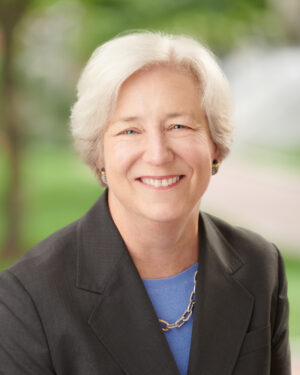
Sara S. Bachman, PhD
Dean
Contact
office: 215.898.5512
fax: 215.573.2099
Email
-
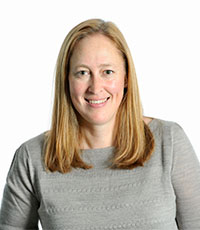
-
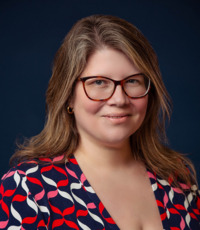
-
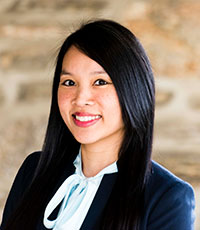
Mai Le, JD, MSW
Administrative Director, MSW Program
Contact
office: 215.746.4031
fax: 215.573.2099
Email
-
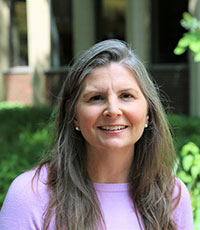
Malitta Engstrom, PhD, LCSW
Associate Professor
Contact
office: 215.573.6454
fax: 215.573.2099
Email